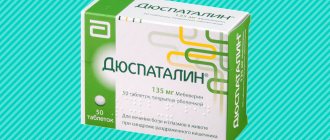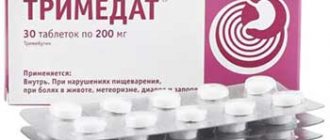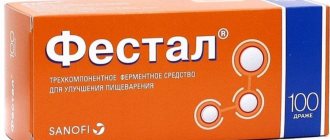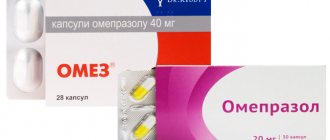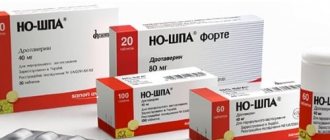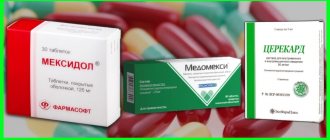The use of trimedat for pancreatitis is dictated by its gentle effect on the functioning of the pancreas and the ability to selectively influence the motor function of the gastrointestinal tract, relaxing spasmodic muscles or toning them during hypotension. Trimedat is a myotropic antispasmodic, the main active ingredient of which is trimebutine.
Features of the effect of the drug on the body
Trimedat is part of a class of drugs that relieve spasms. It has a gentle effect on the smooth muscles of the gastrointestinal tract, mainly the intestines. The main purpose of taking the drug is to relieve spasms from the muscles of the digestive organs to regulate the activity of moving food and normalize the processes of food digestion.
The drug has the following effects on the body:
- Activates contraction of intestinal muscles in a syndrome characterized by decreased motor activity and sluggish muscle behavior.
- Has an antispasmodic effect.
- Relieves colic and discomfort in the stomach or intestines.
- Relieves the symptoms of bloating and flatulence.
- Relieves constipation.
- Activates the excretion of bile and pancreatic juice necessary for digesting food.
- Restores the normal response of the intestines to undigested food.
- Normalizes the processes of moving food from the stomach to the intestines.
- Establishes the sequence of reactions of the gastrointestinal tract to food that enters the body.
Thanks to the medicine, it is possible to eliminate pain, a feeling of congestion in the stomach, improve digestion, get rid of diarrhea or constipation, vomiting or nausea, intestinal and stomach colic.
Effect on the pancreas
Whether it is possible to take Trimedat for pancreatitis in each individual case is decided only by a doctor, since this disease is not an indication for its use.
Generally speaking, the drug has a positive effect on the condition of the pancreas. It helps to improve the passage of food through all organs of the digestive tract, which helps reduce the load on the weakened pancreas.
During the inflammatory process, enzymes that are naturally produced by the pancreas cannot enter the duodenum and are activated directly in the gland, beginning to slowly digest and destroy cells. This leads to the self-destruction of the organ. By relieving spasms from smooth muscles, the drug helps enzymes “cross” through the ducts of the gland into the intestines for further absorption of food.
Normalization of digestive processes accelerates the recovery of the parenchymal organ and relieves its tension. In addition, the drug helps get rid of unwanted symptoms that often accompany pancreatitis:
- nausea;
- bowel dysfunction;
- vomit;
- feeling of fullness in the stomach;
- attacks of acute pain.
Specialists often include this drug in order to relieve an aggravated chronic form of pancreatitis. In this case, it is necessary to further tighten the diet or completely refuse food, as well as increase the dosage of the prescribed enzymatic agents.
Composition and release form
The active functional component of the drug is trimebutine maleate. The composition of additional elements includes:
- Lactose.
- Silica.
- Talc.
- Corn starch.
- Magnesium stearate.
These substances help the stomach absorb the active ingredient.
The medication is available in the form of white tablets. It should be noted that there are two manufacturers of this drug: South Korea and Russia. In terms of content, purpose and effects on the body, these drugs are the same. They differ in the appearance of the tablets and the markings pressed onto them.
Available in packs of 10, 20 and 30 pieces. There are pills with dosages of 100 mg of the active substance and 200 mg.
average cost
The average price category of a medicine depends on the dosage of the active ingredient, the number of tablets and the manufacturer:
- A package of Russian-made medication with ten pills containing 100 mg costs on average 270 rubles. (depending on the pharmacy and region, the price ranges from 207 to 310 rubles), a package of twenty pills with a dose of 200 mg costs 480-520 rubles.
- Tablets made in South Korea are slightly cheaper. A pack of 30 pills with a dosage of 200 mg costs about 450 rubles, and a pack of 20 pills with a dosage of 100 mg costs 200-210 rubles.
The product is dispensed without a medical prescription.
Composition and pharmacokinetics of the drug
Trimedat is often used to relieve symptoms of gastrointestinal diseases. The drug detects its highest concentration 0.5-1.5 hours after taking the drug. During this time, it is absorbed in the intestines and penetrates the blood. Most of the drug is excreted in the urine in the first day. However, it does not have a cumulative ability and does not exhibit toxic effects on the kidneys, so the product can be used for a long time.
Trimebutine is able to regulate gastrointestinal motility, acting in isolation on the enkephalinergic system. In case of intestinal hypotension, it stimulates its work, and in hyperkinetic conditions, it effectively relieves spasms of the intestinal walls and relaxes the smooth muscles of the gastrointestinal tract.
With insufficient secretory activity of the pancreas, there are often situations when the absorption of food slows down and it stagnates in the stomach. Such phenomena reduce the motor activity of the intestine and lead to the growth of pathogenic flora in it. In such cases, gastroenterologists usually recommend taking Trimedat.
It has the necessary effect, significantly improving the patient’s condition:
- relieves pain and discomfort in the abdomen, eliminates cramps and bloating,
- improves intestinal motility in the presence of problems with stool,
- eliminates motility disorders of the sphincter of Oddi and the biliary tract, eliminates congestion in the gastrointestinal tract,
- improves the transportation of food masses,
- alleviates the patient's condition with postoperative intestinal obstruction.
Due to this effect of the drug on the gastrointestinal tract, it can help with the following symptoms:
- unstable chair,
- feeling of heaviness in the stomach,
- nausea or vomiting,
- discomfort under the left rib or upper abdomen,
- IBS.
Trimedat is widely used for both therapeutic and diagnostic purposes. It is used to prepare the patient for diagnostic measures to examine the abdominal cavity (endoscopy, x-ray).
Indications and contraindications for use
Trimedat is mainly prescribed for digestive disorders associated with difficulty passing food throughout the gastrointestinal tract, disturbances in the outflow of bile and the production of enzymes. The big advantage of the drug is the small number of contraindications.
| Indications for use | Contraindications |
| Diseases of the gastrointestinal tract, accompanied by impaired intestinal motility (symptoms include a feeling of fullness after eating, bloating, flatulence, a feeling of satiety inappropriate to the volume of food) | Not recommended during breastfeeding, as its safety for infants has not been studied. |
| Stool disorders | Individual intolerance to the components of the drug |
| Disruption of food digestion processes | Not recommended for use in the 1st trimester of pregnancy |
| Dyspeptic ailments (vomiting, nausea) | The product produced in South Korea should not be used by children under 12 years of age. The ban on the Russian-made drug applies only to children under 3 years of age |
| Colic, intestinal irritation | |
| Pathology of intestinal patency | |
| Intestinal spasms | |
| For preparation for x-rays, endoscopy of the gastrointestinal tract |
The manufacturer of the drug does not give clear instructions about use during pregnancy, since there is no 100% certainty about its safety for the developing fetus. Therefore, the product should be used only after prior consultation with the attending physician.
Qualitative characteristics of drug No. 1: “Trimedat” in the treatment of pancreatitis
"Trimedat", thanks to these targeted, dominant properties, effectively influences the rhythm of processes:
- fermentation of food secretions coming from the stomach;
- further processing of enzymes, breakdown of glucose, production of insulin;
- in the joint ducts (gallbladder, duodenum, liver) through mutual circulation of organic, chemical microelements;
- when destructive changes occur in the form of: spasm, neuroreceptor contractions caused by pancreatitis pathogenesis, it anesthetizes, relieves painful impulses, pain syndrome.
In addition to the listed abilities, the drug acts stably, thereby providing a long-term therapeutic effect. Effectiveness appears within 30 minutes after taking the prescribed dose. Stays in the body for 20-24 hours, has the property of sorption (absorption of harmful microflora).
Trimedat has not only an antispasmodic, but also a regulatory effect. It accelerates gastric emptying, restores normal bowel function, and eliminates all motility disorders. This drug relieves spasms, as well as functional and dyspeptic disorders. Duspatalin is no less effective and quickly relaxes the smooth muscles of the intestine.
Many patients ask what is better for pancreatitis - Duspatalin or Trimedat?
If the pathology is just developing and does not have obvious manifestations, it is better to use Duspatalin. In more severe cases, Trimedat will help. There is an opinion that it is ideal for those who suffer from constipation - after taking the medicine, the stool quickly returns to normal. If the disease is accompanied by pain and other discomfort, preference should be given to Duspatalin.
Both drugs are highly effective and improve the patient’s quality of life after just six weeks of therapy, but it must be carried out under the supervision of a physician. Only a specialist can choose the right treatment tactics and duration, as well as monitor the results.
Possible adverse reactions of the body
Adverse reactions of the body to the drug are quite rare. The most common reason for their manifestation is individual intolerance to the components. Adverse reactions include:
- Unpleasant taste in the mouth, dryness.
- Difficulty urinating.
- Nausea.
- Failure to schedule menstruation.
- Soreness of the mammary glands.
- Often desire to sleep.
- Painful sensations in the head.
- Diarrhea, constipation.
- Allergic reactions on the skin (rashes, itching, burning).
This clinic often takes place after stopping Trimedat or revising the dosage. If the patient continues to feel persistently unwell, a decision is made to prescribe another drug with a similar composition and effect.
Trimedat for children
Trimedat can be used to eliminate symptoms of dyspepsia in children caused by various reasons. You should know that South Korean-made Trimedat can be used only for children from 12 years of age, and Russian Trimedat Valenta - from 3 years.
Most often, Trimedat is used in children of different ages for symptoms of dyspepsia that are not associated with any diseases, such as:
- Abdominal pain;
- Discomfort, feeling of heaviness or fullness in the stomach;
- Nausea;
- Colic and intestinal spasms;
- Flatulence;
- Bloating;
- Constipation;
- Diarrhea not associated with an infectious disease or poisoning).
In children of different ages, the listed symptoms of dyspepsia can occur quite often for a variety of reasons, for example, after eating unusual food or large amounts of carbonated water, overeating, intense physical activity after eating, against a background of nervous tension, climate change or unusual surroundings, etc. . Regardless of the cause that provoked the symptoms of dyspepsia, Trimedat can be used to relieve them in children. In such cases, tablets should be given in the age-specific dosage for 1 to 3 days. The use of the drug should be stopped after the symptoms of dyspepsia have completely disappeared.
Since dyspeptic symptoms develop in children quite often, Trimedat is a necessary drug in any home or travel medicine cabinet, as it quickly normalizes the child’s condition, relieving painful symptoms.
In addition, Trimedat can be used as part of complex therapy for various diseases of the digestive tract in children, such as GERD, gastritis, gastroduodenitis, pancreatitis, etc. In such situations, Trimedat should be given to the child in an age-appropriate dosage in long courses of 1 to 3 months.
The dosage of Trimedat for children depends only on their age, and is the same for various conditions and diseases. This means that for any disease or condition, the child should be given Trimedat in the same dosage appropriate for his age.
Currently, the following dosages of the drug are recommended for children of different ages:
- Adolescents over 12 years old
- take 100 - 200 mg 3 times a day; - Children aged 6 – 11 years inclusive
– take 50 mg (half a tablet with a dosage of 100 mg) three times a day; - Children aged 3 – 5 years inclusive
– take 25 mg (quarter tablets with a dosage of 100 mg) three times a day.
Tablets can be given to a child regardless of food intake, especially if it is necessary to eliminate sudden symptoms of dyspepsia that are not associated with any diseases of the digestive tract.
Adolescents over 12 years of age are given whole tablets of the required dosage (100 mg or 200 mg), which they must swallow whole and wash down with clean, still water. For children 3 to 11 years old, Trimedat 100 mg tablets should be divided into two or four parts to obtain a dose of 50 mg or 25 mg. After the tablet is divided into the required number of parts, you can give the child the required dosage in two ways. Firstly, you can let your baby swallow half or a quarter of the tablet if he already knows how to do this. Secondly, you can grind half or a quarter of the tablet into powder, place it in a spoon, add a little water and let the child drink the resulting suspension.
The choice of method for taking Trimedat tablets for children aged 3 to 11 years depends on their preferences. That is, if it is more convenient for a child to swallow tablets, then you should give him a half or a quarter. If the child has difficulty swallowing tablets and is accustomed to liquid dosage forms (syrups, suspensions, solutions), then it is better to crush half or a quarter of Trimedat into powder, then dissolve it with water, turning it into a suspension, and give it to the baby in this form.
Instructions for use of the drug for pancreatitis
How to take Trimedat for pancreatitis, in what dosage and duration, should be prescribed by your doctor. Each individual case may have its own characteristics depending on the individual characteristics of the person, the stage and severity of the disease, and the presence of accompanying ailments.
General rules for using the drug, depending on the age group of patients and the purpose of using the drug (treatment or prevention), are indicated in the instructions for the medication.
| Adults, teenagers from 12 years old | Children from five to twelve years old | Children from three to five years old | To prevent relapse during remission |
| 100-200 mg three sets per day | 50 mg three sets per day | 25 mg approach per day | 300 mg per day for two months |
The medication should not be used in the 1st trimester of pregnancy, or during breastfeeding. The effect of the drug on infants has not been studied.
Trimedat for acute pancreatitis is prescribed at a dosage of 600 mg per day for a month. After a course of therapy, to prevent relapse, you must continue to use the drug at a dosage of 300 mg per day for another twelve weeks (3-4 months).
The effect of the drug can be noticed already 30-40 minutes after administration. This fact must be taken into account in the presence of an acute form of inflammation of the pancreas, when it is urgently necessary to relieve painful discomfort.
The instructions do not describe the rules for combining the drug with food. Doctors recommend taking the tablets half an hour before or after meals, washing them down with lukewarm water (it is not advisable to use any drinks, compotes, juices or tea). The medication cannot be combined with alcohol intake.
Reviews from doctors
Arthur, Nalchik
“With peace of mind I prescribe Trimedat to my patients. This is one of those drugs that almost instantly alleviates the patient’s condition with irritable bowel syndrome and reduces the symptoms of pathologies such as biliary dyskinesia. In addition, Trimedat has no – or almost no – side effects, and this property is not inherent in all effective drugs. In my practice, only one patient developed a slight tachycardia after taking a dose of the drug. By reducing the dose by a third, we were able to ensure that heart function quickly returned to normal.”
Violetta, Moscow
“A drug like Trimedat copes well with the symptoms of pancreatitis: reflux and constipation. The good news is that it can be given to children from three years old. The only thing that upsets us is the cost, but there are analogues on sale at a much more reasonable price that almost anyone can purchase.”
Analogues of the drug
The group of Trimedat analogues, which have the same active ingredient, consists of:
- Neobutin.
- Trimedat.
- Debridat.
- Pancreatin.
- Duspatalin.
Among the cheaper analogues of Trimedat are Trigan, Sparex. They are similar in therapeutic effects. However, before replacing a prescribed medication with its analogue, you should definitely consult your doctor.
https://youtu.be/9Lbukxoun8g
Release form
Trimedat is available in tablets of 100 and 200 milligrams.
- 100-milligram tablets have a flat-cylindrical shape with characteristic, cross-shaped, intersecting indentations (they are convenient for breaking the tablet into four parts, which may be necessary if the patient is prescribed a lower dose of medication) on one side and the letters T and M (Trimedat) and six triangles ( three on top and bottom) on the other.
- The 200-milligram tablets come in a slightly different form. They are round, biconvex, with two drop-shaped indentations on one side and an approximate line dividing each tablet into two equal parts on the other.
Both forms of the drug are sold in blisters, each of which contains ten tablets hermetically sealed. Blisters are packaged in cardboard boxes, 1, 2 or 3 in each. Thanks to this, you can purchase exactly as much of the drug as prescribed, and at the end of the course of treatment you do not have to worry about what to do with almost the entire package.
Does it help?
Trimedat is one of the best drugs used to treat chronic pancreatitis. This is an effective antispasmodic, stimulating weakened muscles of the digestive system and relieving spasms when the muscles are too tense. By returning normal motility to the intestines, this remedy improves the functioning of the gastrointestinal tract, fights congestion and eliminates the feeling of discomfort that is inevitable when the digestive system malfunctions.
Gastroenterologists prescribe Trimedat to patients with chronic pancreatitis. Its pronounced antispasmodic effect helps reduce or significantly reduce pain. It is worth noting, however, that during exacerbation of pancreatitis this drug is prescribed with some caution. More often, to relieve an attack of acute pancreatitis, as well as eliminate the symptoms of exacerbation that periodically occurs for one reason or another in the chronic form of the disease, other means are used.
Regardless of what form of pancreatitis the patient suffers from, the use of Trimedat has a beneficial effect on his condition, therefore this drug is included in the complex drug therapy of this disease.
Pharmacological properties
Trimedat is classified as a drug for normalizing the functioning of the gastrointestinal tract, as well as intestinal motility in adults and children.
The active substance affects the system of secretion of certain compounds of peptide nature in the stomach and intestines. Trimedat is a synthetic analogue of substances that, through stimulation and suppression, regulate the motility of the entire gastrointestinal tract. These stimuli may be directed to smooth muscle or spasm responses.
It is worth noting that the effect of Trimedat extends to the entire tract. The active substance also reduces sphincter tone in the esophagus. This makes it easier to cleanse the stomach. This process creates additional stimulation of smooth muscles, similar to food-borne irritants. Optimal motor skills are restored and will not require drug stimulation in the future.
After using Trimedat tablets, the active component is absorbed quickly. The maximum concentration in the blood will be reached after two hours. Bioavailability is 4-6%.
The active component binds poorly to blood proteins (about 5%). A small amount penetrates the placenta.
Biological transformations will occur in the liver, and metabolites are excreted in the urine. More than 70% of metabolites are eliminated in the first day. The elimination period for half the dose is 12 hours.
